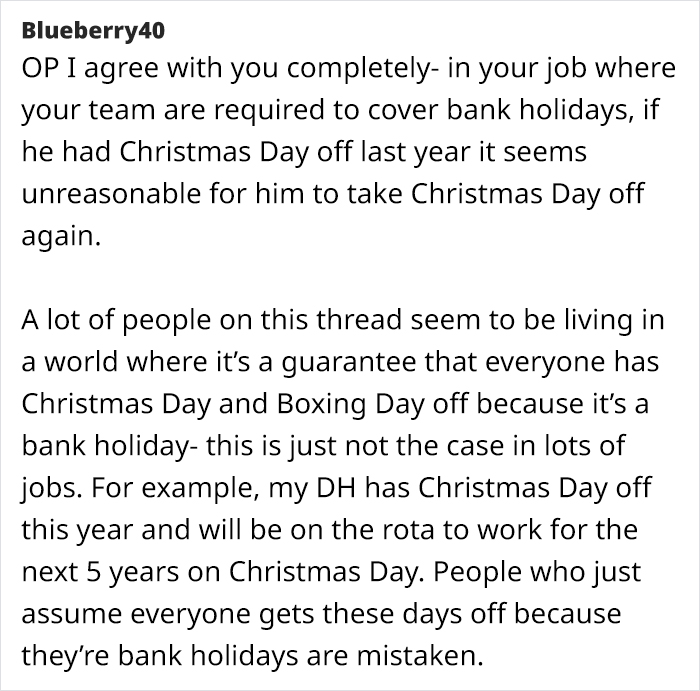Christmas is a time of giving and a season to spread holiday cheer. However, not everyone celebrates it, primarily because ofreligious beliefs.That then begs a rather interesting question: Can an employee who doesnât celebrate Christmas be allowed to take time off during the holiday season?This particular issuearose at aworkplacewhen a Muslim employee decided he wouldgo awayon Christmas week, something his coworker had a problem with.ÂThe colleague is now asking the internet whether they are being unreasonable. Scroll down for the entire story.ÂRELATED:Not everyone celebrates Christmas because of differing religious beliefsImage credits:LightFieldStudios (not the actual photo)A Muslim employeeâs plan to take time off during Christmas week didnât sit well with one of his colleaguesImage credits:Nicole Michalou (not the actual photo)The co-worker provided justifications for why they questioned the manâs vacation plansÂImage credits:Username638There are laws that prohibit any form of religion-based discriminationCompanies want to avoid conflict among employees because of their religion, which led tothe enactmentofTitle VII of the Civil Rights Act of 1964. This law protects workers and job applicants from discrimination based on national origin, race, gender, and religious affiliations.ÂSince Christmas is widely celebrated worldwide, most organizations offer paid time off around this time. Therefore, even employees who donât celebrate this holiday get to enjoy the same luxury as those who do.ÂUnder this law, a company cannot impose religious practices on people with differing beliefs or make attending holiday events mandatory, especially if alcohol is involved. In such cases, employeesmay suetheir employers for discrimination.ÂIn the story, the man had the right as an employee to use his paid time off whenever he wanted to, regardless of whether he celebrated Christmas. He wasnât forced to partake in holiday traditions, either.ÂPlanning ahead is the best way to avoid PTO conflicts during the holiday seasonThe holiday season means an influx of people wanting to take time off to celebrate with their loved ones. Planning weeks, even months, in advance may help avoid potential conflict.ÂDana Burch, senior counsel for labor relations law firm Liebert Cassidy Whitmore, advises creating a holiday calendar highlighting important dates and sharing it with coworkers.ÂOpen communication is equally important, especially for vacation-related matters. Burch also reminds employees to coordinate with colleagues to cover essential tasks during their time off.ÂâBe proactive, communicate openly, and keep the spirit of the season alive in your workplace,â Burch wrote in an article onLinkedIn.ÂThe author has no control over their colleagueâs decisions andwhen he wantsto take his vacation. However, they do have control over their own schedule, which they could have fixed ahead of time.Readers had mixed reactions to the storyThanks! Check out the results:
Christmas is a time of giving and a season to spread holiday cheer. However, not everyone celebrates it, primarily because ofreligious beliefs.
That then begs a rather interesting question: Can an employee who doesnât celebrate Christmas be allowed to take time off during the holiday season?This particular issuearose at aworkplacewhen a Muslim employee decided he wouldgo awayon Christmas week, something his coworker had a problem with.Â
The colleague is now asking the internet whether they are being unreasonable. Scroll down for the entire story.Â
RELATED:
Not everyone celebrates Christmas because of differing religious beliefs

Image credits:LightFieldStudios (not the actual photo)
A Muslim employeeâs plan to take time off during Christmas week didnât sit well with one of his colleagues








Image credits:Nicole Michalou (not the actual photo)
The co-worker provided justifications for why they questioned the manâs vacation plansÂ




Image credits:Username638
There are laws that prohibit any form of religion-based discrimination
Companies want to avoid conflict among employees because of their religion, which led tothe enactmentofTitle VII of the Civil Rights Act of 1964. This law protects workers and job applicants from discrimination based on national origin, race, gender, and religious affiliations.Â
Since Christmas is widely celebrated worldwide, most organizations offer paid time off around this time. Therefore, even employees who donât celebrate this holiday get to enjoy the same luxury as those who do.Â
Under this law, a company cannot impose religious practices on people with differing beliefs or make attending holiday events mandatory, especially if alcohol is involved. In such cases, employeesmay suetheir employers for discrimination.Â
In the story, the man had the right as an employee to use his paid time off whenever he wanted to, regardless of whether he celebrated Christmas. He wasnât forced to partake in holiday traditions, either.Â
Planning ahead is the best way to avoid PTO conflicts during the holiday season
The holiday season means an influx of people wanting to take time off to celebrate with their loved ones. Planning weeks, even months, in advance may help avoid potential conflict.Â
Dana Burch, senior counsel for labor relations law firm Liebert Cassidy Whitmore, advises creating a holiday calendar highlighting important dates and sharing it with coworkers.Â
Open communication is equally important, especially for vacation-related matters. Burch also reminds employees to coordinate with colleagues to cover essential tasks during their time off.Â
âBe proactive, communicate openly, and keep the spirit of the season alive in your workplace,â Burch wrote in an article onLinkedIn.Â
The author has no control over their colleagueâs decisions andwhen he wantsto take his vacation. However, they do have control over their own schedule, which they could have fixed ahead of time.
Readers had mixed reactions to the story










Thanks! Check out the results:You May LikeGuy Works 50+ Hours/Week Only For His Successor To Automate Everything And Have Nothing To DoIndrė LukošiūtėSupervisor Reprimanded By HR, He Leaves Them To Deal With Troublesome EmployeeRūta Zumbrickaitė26 Professions That Everyone Hates and Roasts Until They Actually Need Their HelpRūta Zumbrickaitė
Indrė Lukošiūtė
Rūta Zumbrickaitė
Work & Money